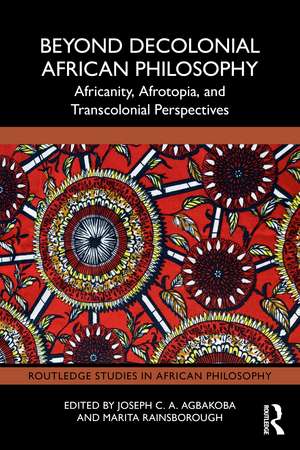Beyond Decolonial African Philosophy: Africanity, Afrotopia, and Transcolonial Perspectives: Routledge Studies in African Philosophy
Editat de Joseph C. A. Agbakoba, Marita Rainsboroughen Limba Engleză Paperback – 13 dec 2024
Beginning with an overview of philosophy in contemporary Africa, the first half of the book goes on to critically interrogate and rethink decoloniality’s deconstructivist approach. The second half of the book considers a range of alternative new conceptualizations of Afrotopia and Africanity that transcend decolonial theory, drawing on constructivist and creative approaches. The book considers key questions such as:
• Is Africanity immutable (essentialism), or mutable (nominalism)?
• Should we emphasise idealist, identitarian concerns, or pragmatic, developmentarian concerns?
• Should we prioritise African agency, or structures and circumstances?
• Should Africa embrace hybrid interculturality and creative self-manifestive identity or essentialist purity?
Drawing on rich insights from African philosophers across the continent, this book challenges students and researchers to think beyond the concept of decolonization to alternative forms of African identities and African futures.
| Toate formatele și edițiile | Preț | Express |
|---|---|---|
| Paperback (1) | 311.37 lei 3-5 săpt. | +22.51 lei 4-10 zile |
| Taylor & Francis – 13 dec 2024 | 311.37 lei 3-5 săpt. | +22.51 lei 4-10 zile |
| Hardback (1) | 1006.30 lei 6-8 săpt. | |
| Taylor & Francis – 13 dec 2024 | 1006.30 lei 6-8 săpt. |
Preț: 311.37 lei
Nou
Puncte Express: 467
Preț estimativ în valută:
59.59€ • 62.05$ • 50.36£
59.59€ • 62.05$ • 50.36£
Carte disponibilă
Livrare economică 18 februarie-04 martie
Livrare express 01-07 februarie pentru 32.50 lei
Preluare comenzi: 021 569.72.76
Specificații
ISBN-13: 9781032683447
ISBN-10: 1032683449
Pagini: 302
Dimensiuni: 156 x 234 x 20 mm
Greutate: 0.45 kg
Ediția:1
Editura: Taylor & Francis
Colecția Routledge
Seria Routledge Studies in African Philosophy
Locul publicării:Oxford, United Kingdom
ISBN-10: 1032683449
Pagini: 302
Dimensiuni: 156 x 234 x 20 mm
Greutate: 0.45 kg
Ediția:1
Editura: Taylor & Francis
Colecția Routledge
Seria Routledge Studies in African Philosophy
Locul publicării:Oxford, United Kingdom
Public țintă
Academic and PostgraduateCuprins
Introduction I. Philosophy and Decolonial African Thinking 1. Philosophy in the Present Context of Africa II. Challenging and Rethinking Decolonialism 2. Criticisms and Self-Criticisms: The Decolonial Question and Some ‘Unthinkables’ in Francophone Experiences 3. Decolonization Beyond History: Rethinking the Epistemology of Resistance 4. ‘The Locals Also Have a Hand in It’: Properly Understanding Coloniality for the Rethinking of Decoloniality in Africa 5. Africa’s Future: Political and the Economic Discourse 6. Decoloniality or Indigenisation? The Vexing Question of Decolonizing Education in Africa III. Decolonialism Revisited – New Concepts 7. Beyond the Politics of Decolonial Thought 8. Quest for Afrotopia in Late Postcolonial Lusophone Literature: A Focus on Guinea-Bissau 9. Constructivism as the Root of Transcolonial Approach to African Affairs 10. On the Decolonial Paradigm of Development 11. The Case Against Decolonisation: A Legal Perspective 12. Towards a Dialogic Trans-colonial African Identity 13. Refracting Ubuntu Philosophy Through a Constructivist Lens 14. Reappraisal and Conclusion
Notă biografică
Joseph C. A. Agbakoba is a professor of philosophy at the University of Nigeria. He is a 2022 recipient of the prestigious Georg Forster Research Award. He has been a Volkswagen Foundation grantee, an Alexander von Humboldt fellow, an alumnus of Budapest’s Central European University, SUN program, a visiting scholar at Cape Coast and Frankfurt. He was Head of Department of Philosophy at the University of Nigeria from 2007-2010 and Dean, School of General Studies, 2012-2013; from 2013 to 2017, he was Deputy Vice Chancellor (Vice President) at Madonna University Nigeria. He is a former president of the Nigerian Philosophical Association. Agbakoba is also the Regional Coordinator for Africa for the Council for Research in Values and Philosophy (CRVP), Washington DC; the Vice President for Africa for COMIUCAP (Conférence Mondiale des Institutions Universitaires Catholiques de Philosophie) and a member of the Steering Committee of the International Federation of Philosophical Societies (FISP), 2008 to 2024. His current research interest is in the field of development philosophy and ethics in relation to Africa and intercultural philosophy. He has published widely locally and internationally.
Marita Rainsborough teaches as an associate professor (PD) at the Institute for Philosophy and Art History at Leuphana University Lüneburg and at the Institute for Romance Studies at Kiel University, Germany. She is an associate member of the Centre of Philosophy University of Lisbon (CFUL) and co-editor of the journal ‘Estudos Kantianos’. She was visiting professor at several universities in Brazil, for example at the Federal University of Minas Gerais (UFMG), the Federal University of Bahia (UFBA) and the University of Campinas (UNICAMP). Her recent publication is Intercultural thinking in African Philosophy: A critical dialogue with Kant and Foucault. London, New York: Routledge, 2024.
Marita Rainsborough teaches as an associate professor (PD) at the Institute for Philosophy and Art History at Leuphana University Lüneburg and at the Institute for Romance Studies at Kiel University, Germany. She is an associate member of the Centre of Philosophy University of Lisbon (CFUL) and co-editor of the journal ‘Estudos Kantianos’. She was visiting professor at several universities in Brazil, for example at the Federal University of Minas Gerais (UFMG), the Federal University of Bahia (UFBA) and the University of Campinas (UNICAMP). Her recent publication is Intercultural thinking in African Philosophy: A critical dialogue with Kant and Foucault. London, New York: Routledge, 2024.
Descriere
This book dives into decoloniality discourse, challenging some of its shortcomings and offering alternative perspectives on the nature of Africanity and Afrotopia from leading African philosophers. The book challenges students and researchers to think beyond decolonization to alternative forms of African identities and futures.













